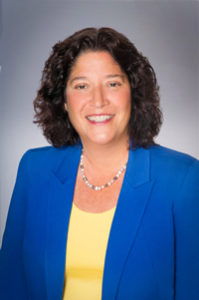
Eugene Grygo, Chief Content Officer, FTF News
Maria T. Vullo, the former Superintendent of the New York State Department of Financial Services (DFS), is the regulator-in-residence for the FinTech Innovation Lab New York and she will provide strategic counseling and mentorship to the companies in the lab.
The lab, founded by Accenture and the Partnership Fund for New York City in 2010, focuses on early- and growth-stage enterprise technology companies in order to help them “accelerate product and business development through in-depth engagement with top financial services and venture capital executives,” officials say.
Vullo will take part in a 12-week program that launched April 3, advising the upstart tech providers on how to “consider regulators’ priorities when collaborating with leading banking and insurance institutions,” officials say. Vullo joins Cris Conde, the former CEO of SunGard, among other executives in serving as “in-residence” experts for the lab. Vullo left the NY DFS earlier this year.
During her tenure as superintendent, Vullo oversaw regulation and supervision of New York’s financial services industry, prioritizing cybersecurity, “requiring New York banks and insurance companies to more thoroughly protect themselves and consumers,” officials say.
Before DFS, Vullo was a partner at the law firm Paul, Weiss, Rifkind, Wharton & Garrison, and she specialized in financial services, securities, real estate finance, restructuring, antitrust and intellectual property law, officials say. In addition, Vullo served as executive deputy attorney general for economic justice for then-New York State Attorney General Andrew Cuomo.
“Under Maria Vullo’s leadership, New York State has been at the cutting edge of regulation, most notably with her landmark cybersecurity regulation that serves as a model for the nation,” said Maria Gotsch, co-founder of the FinTech Innovation Lab New York and president and CEO of the Partnership Fund for New York City, in a prepared statement. “Her deep understanding of the regulatory landscape and mindset will be invaluable as this year’s class works closely with senior executives from financial services to accelerate the adoption of new technologies.”
The lab participants that Vullo will work with for the 2019 FinTech Innovation Lab New York, a 12-week program, are:
- CloudFrame — which transforms legacy mainframe applications into cloud-native Java;

Maria T. Vullo, ex-Superintendent, NY State DFS
- Cyberwrite — which offers a simple-to-understand report benchmarking the risks and financial impact of cyber-attacks on any small or medium-sized business worldwide in real time and on demand;
- Extend — which is a digital credit card distribution platform for banks, fintechs, businesses, and their customers;
- FairFrame — combines artificial intelligence (AI) and decades of social science research into an easy-to-use text analysis platform: a “spellchecker” for unconscious bias;
- Genus AI — which offers a next-generation enterprise AI platform that extends financial institutions’ existing systems to help them understand and engage with customers in an emotionally intelligent way;
- Goalsetter — whose goal-based savings and gifting platform enables families to use social savings, gifts and gamification to teach kids financial literacy and independence;
- HyperScience — which uses proprietary machine learning technology to automate data entry and streamline document processing;
- Inpher — which uses cryptographic technology for advanced analytics and AI applications without exposing or transferring sensitive data across departments, organizations or jurisdictions;
- Magma Trading— which has created a new kind of stock market that allows broker-dealers to trade large blocks of equities. The Magma structure enables market-making firms to post large potential trades without that sidestep high-speed electronic sweeps;
- Npm — which manages the world’s largest software registry, empowering 11,000,000 JavaScript developers with industry-leading tools and services;
- And Theta Lake — offers a cloud-based communication compliance platform that uses AI and deep learning to detect compliance risks in “what was said, shared, and shown, powering risk insights and workflow automation, while also providing secure, compliant archiving for video, voice, and chat — all driving down the cost of compliance.”
